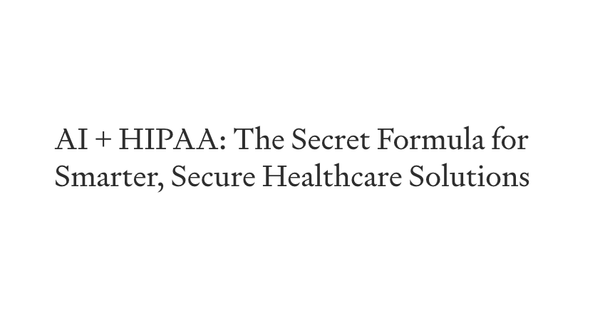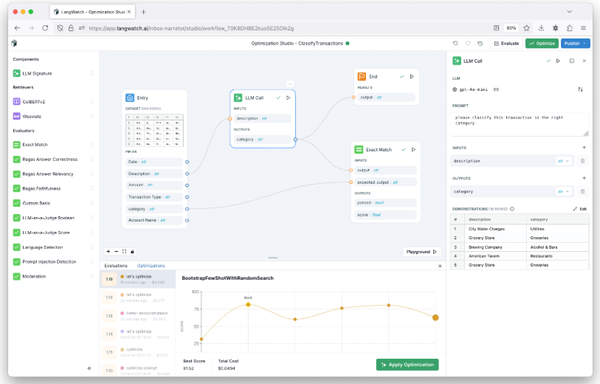Why Doctors Are Already Excellent Prompt Engineers: The AI Shift in Healthcare
Table of Content
As artificial intelligence (AI) becomes increasingly integrated into healthcare, doctors are uniquely positioned to lead this transition. Their innate problem-solving abilities, meticulous attention to detail, and structured thinking make them ideal candidates for mastering a crucial new skill: prompt engineering.
This skill allows professionals to interact effectively with AI systems by crafting precise queries, ultimately yielding better results.
Healthcare research facilities and hospitals are already adopting AI technologies, showcasing the practical applications of this evolution.
Let's examine the current AI services used in healthcare and how they demonstrate why doctors are well-suited to prompt engineering.
Why Doctors Are Already Good at Prompt Engineering
Doctors possess several key skills that align perfectly with prompt engineering, a crucial practice in AI-human interaction. Let's examine these natural alignments:
1. Analytical Mindset
Doctors are trained to analyze complex situations and break down information into manageable parts. This analytical approach is essential when crafting prompts for AI, as it guides the system toward providing valuable insights.
2. Precision in Describing Symptoms
Doctors excel at converting subjective patient symptoms into structured, objective data. This skill aligns perfectly with prompt engineering, where crafting detailed and precise input is crucial for effective AI responses. A physician's ability to clearly describe a patient's condition can significantly boost AI's diagnostic capabilities.
3. Systematic Organization and Decision Trees
In healthcare, decision-making often follows a structured path, using classification trees and algorithms to reach a diagnosis. This methodical approach mirrors how AI systems work. By applying their decision-making skills to prompt engineering, doctors can optimize AI queries for the most relevant outputs.
4. Continuous Learning and Problem-Solving
Doctors are lifelong learners, continuously updating their knowledge and adapting to new medical advancements. AI systems evolve in a similar manner, requiring ongoing input refinement.
Physicians' innate drive to learn makes them ideal candidates for becoming prompt engineers, constantly fine-tuning their interactions with AI systems.

5. Medical Education and Case Study Experience
Medical education emphasizes structured problem-solving, critical thinking, and case-based learning—all skills that are crucial in crafting effective prompts for AI. Doctors’ familiarity with creating structured, detailed case histories will help them thrive in AI-driven environments.
Why Doctors Need to Evolve as Prompt Engineers
As AI increasingly influences healthcare, doctors must adapt their skills to effectively guide these technologies. Prompt engineering is crucial for maximizing the potential of AI tools in medical settings.

By honing their ability to craft precise, context-rich prompts, doctors will reap benefits in:
- Faster, more accurate diagnoses: AI systems can process vast amounts of data quickly, but they need well-defined inputs from doctors to function optimally.
- Personalized medicine: By working with AI, doctors can provide tailored treatments based on patient-specific data, guided by well-crafted prompts.
- Improved patient outcomes: The ability to communicate effectively with AI models will lead to better predictions, treatment plans, and overall patient care.
The shift to AI-driven healthcare isn't merely about embracing new technologies—it's about transforming how doctors engage with data, diagnoses, and treatments. Prompt engineering provides a clear avenue for physicians to spearhead this transformation.
FAQs
Q: What is prompt engineering?
Prompt engineering is the art of crafting precise inputs—or prompts—to guide AI systems in generating relevant and useful outputs. In healthcare, this involves creating structured, detailed queries that enable AI models to provide accurate diagnostics and treatment recommendations.
Q: Why are doctors suited to prompt engineering?
Doctors possess innate skills for effective prompt engineering. Their training equips them to dissect complex medical cases, organize information systematically, and provide detailed, precise descriptions—all crucial elements for crafting effective AI prompts.
Q: Can prompt engineering improve healthcare outcomes?
Yes, through well-structured prompts, doctors can help AI systems offer more accurate diagnoses, personalized treatment plans, and faster processing of medical data.
Q: Do doctors need to know programming to be effective prompt engineers?
Not necessarily. Prompt engineering primarily relies on natural language inputs. Doctors can focus on clearly and precisely describing medical cases, symptoms, or data without extensive programming knowledge.
Q: How can doctors start improving their prompt engineering skills?
Doctors can begin by using AI tools in their current practice, learning how different inputs affect the quality of AI outputs. Experimenting with structured prompts in diagnosis and treatment planning can help refine their skills.
Q: What is the future of AI in healthcare?
AI will continue to enhance diagnostic accuracy, accelerate medical data processing, and enable more personalized treatments. Doctors who master prompt engineering will be instrumental in shaping and refining these AI tools, ensuring they meet the evolving needs of healthcare.
Q: How does prompt engineering affect patient care?
By crafting more precise prompts, doctors can ensure that AI models produce outputs that are relevant to the patient’s specific condition, improving the accuracy of diagnostics and treatment plans.
As doctors develop their prompt engineering skills, they can harness AI technologies more effectively, leading to improved healthcare outcomes for their patients.












